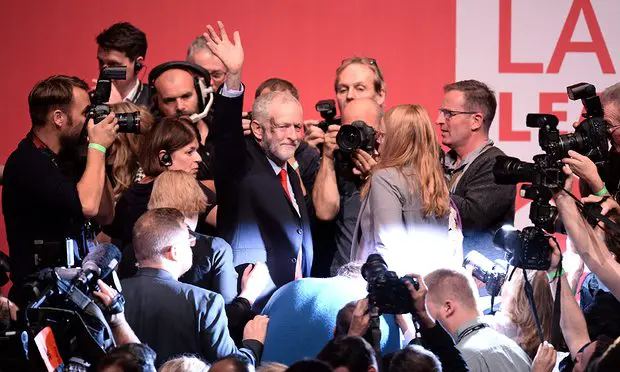by Larry Neild
Jeremy Corbyn emerged Saturday as the undisputed leader of western Europe's largest political party.
But whether Labour's army of more than 500,000 members will win the keys of 10 Downing Street for Corbyn was a burning question here after the result of the party's leadership contest was announced to cheers and applause at the city's waterfront arena.
Political commentators have already described Saturday's result as historic, saying it takes control of the party from its Westminster-centric parliamentary group and has given it to ordinary followers at grassroots level.
Corbyn won 61.8 percent of the votes, a total of 313,209 against the remaining 38.2 or 193,222 votes won by leadership challenger Owen Smith.
Welsh MP Smith was the flag carrier for the 172 Labour MPs who in June passed a vote of no confidence in Corbyn as leader.
Their civil war against Corbyn started when MP Angela Eagle launched a bid for the leadership in an attempt to show Corbyn the door. He stood firm and resisted all attempts to block his bid to defend the job as leader he won last September with a landslide victory.
Eagle dropped out of the race, the hope being a single challenger stood the best chance of removing Corbyn. It was left to Smith to take on the people's champion.
What will dismay anti-Corbyn supports is the votes he won from long standing party members, the group it was thought most likely to back Smith. Instead the number of members who back the 67-years-old left winger rose by over 46,000 to 168,216, with votes among registered and affiliated supporters also up.
It almost certainly guarantees that Corbyn will not face another challenge and will lead Labour into the next general election.
Corbyn said the party could defeat Theresa May's Conservative Government to take power, but it will mean all members of the party uniting to work together.
Corbyn has handed out an olive branch to encourage his estranged MPs to come together. "Let's wipe the slate clean from today," he pleaded in his victory speech, saying "we have much more in common than divides us."
Some of Labour's most experienced MPs have already indicated they won't serve in Corbyn's front bench team.
One of those who have announced they will not serve is his challenger Owen Smith.
Corbyn's rise to popular power spells an end to the New Labour project started under Tony Blair. He steered the party from its working class traditions to win broader appeal among areas of the country not traditionally considered as Labour voters.
Corbyn, backed by a support group known as Momentum, has hit a chord with traditional Labour voters who felt left behind by Blair-style Labour and its successors.
Many politicians and veteran commentators doubt Corbyn's style of leadership will deliver any chance of the party winning. They fear Labour will remain in the political wilderness until it realizes it needs broader popular appeal to stand any chance of getting the keys to Number 10.
Deputy Leader Tom Watson said it had been a bruising summer for Labour, but he welcomed calls for the party to unite.
Watson said an early general election in Britain was expected and Labour needed to focus on its general election priorities.
Although Corbyn's victory was expected by all sides, the scale of his endorsement has strengthened his grip on the party.
It could be some days before a picture emerged of whether Labour has finally ended its civil war. The consensus in Liverpool Saturday is that the war is far from over.
In Britain, Labour is the official opposition party in parliament, but in the fall-out between the Labour Parliamentary Party and Corbyn, most of his front bench team resigned.
One of the leading politicians to respond to the result was Ed Miliband, whose resignation after the 2015 general election, pave the way for Corbyn's rise to power.
"Now is the time for the party to unite and to focus on the country," said Miliband.
Looming on the horizon is a battle over how Labour's front bench team is chosen. Labour MPs want to decide who should go forward by himself as leader, a third of the names from Labour MPs and the other third from grassroots members.
Ironically it could be Prime Minister May who blows the whistle on Labour's warring faction. If May calls an early general election, Labour will immediately end its squabbling to take on the fight.
(APD)
 简体中文
简体中文

